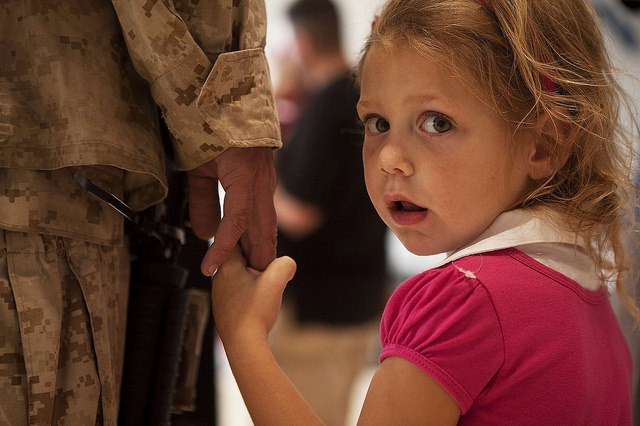
Image by World’s Direction via Creative Commons
By Heather Cameron
The valuable contribution made by the British armed forces is widely recognised and this Remembrance Sunday, thousands will pay an especial tribute to them.
In recent years, the government has taken encouraging steps to support Service personnel, particularly those returning to civilian life. However, there is also a need to address the effects of military life upon families and children, in particular.
Unique challenges
A recent report by the Centre for Social Justice (CSJ) highlighted the many unique challenges that military families face, including extreme mobility, inflexible work regimes, frequent separations, and the consequences of mental illness on the entire family. Children can be particularly affected, with significant effects upon the way they lead their lives both during the time of service and in the future.
Evidence suggests the demands of serving in the armed forces can put relationships under strain, leading to substantial demands on both spouses and children.
Children can be particularly affected by frequent moves that can disrupt their education and affect their friendships.
The CSJ report highlights a number of worrying impacts on children, including:
- increased behavioural, emotional and disciplinary problems;
- having to grow up too early;
- lower academic attainment; and
- social isolation.
The number of children affected by mobility is sizable. According to a study by Ofsted, the average mobility for Service children in primary schools is around 70% every year. Indeed, this figure may be even higher as there is no accurate record of the number of Service children in the UK.
The study also indicated that many Service children who move frequently do not perform as well as their peers and are less likely to achieve higher grades if they miss or repeat parts of the curriculum. There was evidence to suggest that the learning of many children had slowed or receded by continual moves and that they needed additional support to catch up.
As the CSJ argues, “education is one of the most important factors that will help military children after their family leaves the Armed Forces”. It is therefore vitally important that they receive the support they need.
Support
Some positive steps have been taken to provide service children with additional support.
In June 2014, the government introduced a Pupil Information Profile (PIP), which provides some basic information for teachers about children from military families making the transition between schools. It is suggested that these, along with Moving Schools Children’s Activity Packs (filled in by the child and sent to the school) have gone some way to addressing the alarming lack of communication between schools.
However, it is also noted that the poor transfer of information between schools remains a problem as the PIP still only requires very basic information and both the PIP and Activity Packs rely on parents and teachers being aware of their existence.
A number of important outcomes have been achieved through the government’s Armed Forces Covenant, including a Service Pupil Premium (SPP) in England so that 60,000 Service pupils in state schools get extra support. The SPP acknowledges that Service children need more assistance. Thus, since 2013, in addition to the Pupil Premium, the government has also offered a SPP of £300 a year per child of Service personnel on the school roll.
Similarly to the PIP, this also relies on parents informing the school that one of them is in the Service. With no accurate record of the number of children in need, it is therefore not possible to know whether children and schools are receiving the extra assistance required.
Looking forward
Clearly, important steps have been taken and the CSJ applauds the government’s commitment to do more on children’s education. However, it is also clear that “the government has further to go to support the service family as a unit.”
The report therefore sets out a series of recommendations for improvement in support for military families, including several targeting children’s education. In particular, it calls for increased stability of education for Service children and greater support for transitory children, their parents and the schools.
If implemented, the CSJ describe their recommendations as an opportunity for the government to build on the good work already done, which “would provide a great service to the men and women who, in turn, provide a great service to us.”
Follow us on Twitter to see what developments in public and social policy are interesting our research team.
Share
Related Posts
A recent item on BBC Radio 4’s Today programme generated an unusually high number of responses from listeners. A man who had lost his job in the financial services sector at the age of 57 described his difficulty in trying ....
By Donna Gardiner While free school meals (FSM) have been available in England on a means-tested basis since 1944, recent years have seen a renewed focus upon the potential benefits of providing free school meals to all school-aged children. Currently, ....
By Robert Kelk and Chris Drake A new start for an old challenge? The recent appointment of Marc Lemaître as the European Commission’s director general for research and innovation (R&I) has returned Europe’s R&I gap to the spotlight. Previously head ....
By Hannah Brunton UNESCO’s Global Media and Information Literacy Week 2022 takes place from 24-31 October 2022 under the theme of “Nurturing Trust”, giving governments, educators, information professionals, and media professionals the chance to discuss and reflect on critical issues ....
